By Maryanne Maina
Luxury travelers are increasingly more conscious of their environment, motivated by the internal journey that accompanies these types of personally relevant physical experiences.
One of these motivations is to seek luxury experiences that are rare and bespoke, something that could be found in a hotel, on safari, in a restaurant, a trip to the arctic or any other unique experience that would satisfy this kind of consumer.
Food for thought
The curation of an experience that appeals to a luxury consumer at a specific, personal level is crucial in the luxury travel and hospitality markets.
Also, with the rise of online retail, and to satisfy this desire, several luxury brands have now created cafes and restaurants to extend their brand experiences.
Gucci, Burberry, Vivienne Westwood and Tiffany now have their brands packaged for the palate. But these cafes also provide a luxury experience to capture the same clients who are buying their products as it provides them with a slow luxury shopping environment, which ultimately keeps them engaged with these brands for a longer period.
Down in Cape Town, South Africa, which has become a culinary hot spot in recent years, you will find a new coffee, café and patisserie brand that was developed to provide the consumer with a multi-sensory luxury experience. This can be seen in every aspect of the brand, from the packaging to the specialist product offering, to the smell, taste, feel and the entire visual experience, which inspires all five senses of the consumer entering the store and cafe environment.
“Luxury is an experience,” said Wilhelm Liebenberg, cofounder/CEO of Coco Safar. “It has to speak to all five senses and that is what Coco Safar aims to achieve when welcoming consumers into its space.
“Here you feel as if time has slowed down, like you are on an old-fashioned luxury train journey, wrapped in nostalgia, while indulging in the brand’s various luxury offerings,” he said.
“Everything here is bespoke and handmade, from the furniture to the coffee, to the cold brew to the patisserie, we make it all by hand right here in Cape Town. The name Coco Safar is reminiscent of the Coco from Coco Chanel, which symbolizes couture, refinement and elegance, while Safar is the Swahili word for journey. Coco Safar is a journey of nostalgia, elegance, craftsmanship, couture and luxury.”
All this is made accessible to the consumer, as Coco Safar offers you a little piece of luxury at the price of an espresso.
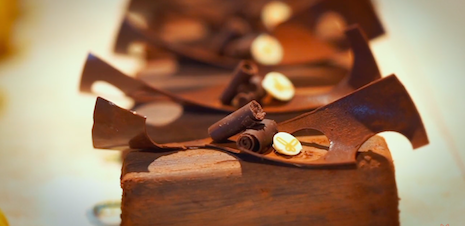 The chocolate is made by Coco Safar. Image credit: Coco Safar
The chocolate is made by Coco Safar. Image credit: Coco Safar
To the tea
The new Coco Safar flagship store houses the world’s first Botanical Coffee and Rooibos micro-brewery, the most sophisticated coffee roaster on the African continent, and a top-quality patisserie and chocolate atelier, enjoyed sitting down in the café, or to take away.
Consumers also have access to the Capsule Emporium, Espresso Bar, Couture Patisserie counter and the Luxury Café environment, which is all housed under one roof.
“At our micro-brewery bar, we offer cutting-edge botanical mixology, where we brew with plant based completely natural materials,” Mr. Liebenberg said. “The Rooibos cold-brew tea is brewed for 76 hours or six days, like you would brew beer except it contains zero alcohol.
“Our tonics are infused with Rooibos and we serve it on tap like beer,” he said. “You can sit by the bar and watch the brewery preparing the brews. It is a rare experience.”
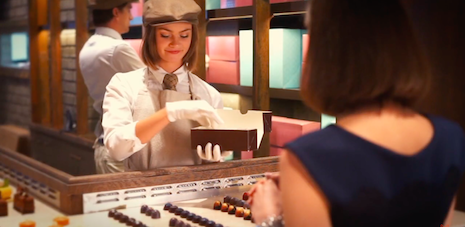 Serving pastries at Coco Safar. Image credit: Coco Safar
Serving pastries at Coco Safar. Image credit: Coco Safar
To add to the travel theme of the brand is the specialist coffee and Rooibos capsule collections where each blend is named after an iconic city, such as Manhattan, Napoli, Kaapstad (the Afrikaans name for Cape Town), Havana, Stellenbosch and Saint Tropez.
The next collections to be released will include Marrakesh, Jakarta and Lisbon. When enjoying the capsules, the consumer takes a journey of discovery and nostalgia, with each blend inspired by one of these global iconic cities.
As part of its global brand expansion plan, Coco Safar plans to open a major flagship store in New York later this year, followed by Los Angeles, Tokyo, Shanghai, Hong Kong, Buenos Aires and London in the 36 months to follow.
Coco Safar has managed to create the first oxygen-tight, compostable, Nespresso-compatible coffee and Rooibos bio-capsules on the African continent, and possibly the only one commercially available in the world at this point.
These capsules are home compostable after 160 days in the ground. This was a very important development for the brand, as it ensures that Coco Safar appeals to a growing luxury consumer base that is conscious about sustainability and the environment.
Being based in Cape Town is essential since South Africa is an important luxury market for several reasons. It is home to at least 10,350 individuals with assets of a minimum value of $5 million and home to at least 30 individuals with assets of a minimum of $500 million, according to the recently published 2018 Knight Frank wealth report.
As one of the top tourist hot spots in the global tourism industry today, it is a compelling city to visit, as well as offering excellent second or third residential options for wealthy individuals.
Cape Town has a well-established hospitality market with a large variety of luxury brands present, especially in the culinary scene. South Africa is also home to Johann Rupert, chairman of Richemont, owner of such luxury brands as Cartier and Piaget.
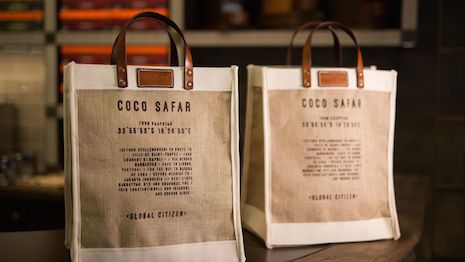 Bags of merchandise at Coco Safar. Image credit: Coco Safar
Bags of merchandise at Coco Safar. Image credit: Coco Safar
THE OVERALL LUXURY market, encompassing both goods and luxury experiences, was estimated to be valued at more than $1.2 trillion globally in 2017. This includes both luxury goods and experiences.
Luxury experiences remained attractive to customers, as illustrated by sales of high-end food, wines and other beverages whose sales have been steadily increasing globally.
In 2017, luxury cars, hospitality and personal goods together accounted for more than 80 percent of the total market globally.
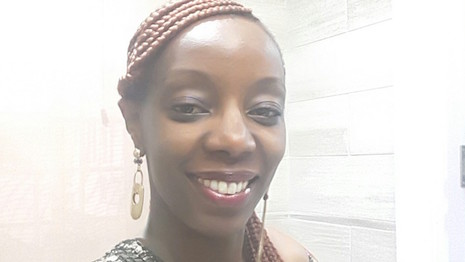 Maryanne Maina
Maryanne Maina
Maryanne Maina is a luxury communications consultant and journalist dividing her time between France, Kenya and Nigeria. Reach her at [email protected].
{"ct":"3fBZFCCFLLrtMRPV90Nj65ilL3807oWohI9\/yYDwtqLyqVZ\/kkGM9lDzKR\/NrJKfZkpVaiBxIf\/Kr+SN\/reiQnkIMMjZf2dSo29Idb8vZhyZa1RwGhN2B4iTyUMS4F6Gb0ZuWwphht8EErrd6nmVSnTPgwUdO1Lq\/f1SGkSoYF8TAbwT33qt9eD+VAJsZMdmw6GQNb\/Cvx36d1Tse+FRHs6pTRutaPwmDc3I8kv07xhimhjI6ToKNEYCOu2z8njmplk5DcD69n+oVmv\/Ud94mPRsZtwpzblSDEUpiT7w+ysyGjKc\/8Nv5gZh2NHU9gVvBbGH1YaHa9lS2QNNDGtaeFvvE63g85dICiEJUPaw58PHfdeF6TxrPJ56yd91kR3lQvnYnwwtoeO1zzbcvXYBj+yuhgEYThYweWAXQ7rHb5IUUybDK7dL4Ufpdxa8ICE2TpGeuG8wXaMptXUXrTiLWMsF0Osp\/WtZ2yOCmAaQuLdhzsvMY\/8GP5LsBVGUgrgKJf1Easz6eo459onCsvxGWSd5JOTcgpQPnpuzFUvnHB+2mTtD3b9tX8IOFJb509ytjIJ6UlUr12u7OAbRch3N1EeVfNE\/cxdN3WNH6ZIxX2tbHD2I9bDAx2Xm6K9WpMRRIjS+n76VvrIggL5xBpbakct6zhQck9FR2XV+wnBZ\/VWjqiha0RtQe9sQvayL+jxieuhem\/OFBatuODShnH7npl3chV1IB7AU3u1U4KWMq4M659FgPyXK1tu020RHBHc9EpxZ8Xnj+kQiRto9dqnOIPnNHECqUVEnhoH6SqzcgEs0HH0ynFTVRzD9+7xUPZaV8T1XqmfqDSsfK7rq+9gWtg0kNhq57fmw6uJaXcleqIbaHbQjYbcf5voGIad\/TAcdWJSEFO+TFmaH+1asE95doiw1Qh65ZCXzqb5EBPzXZL88k+V1fLlBCPTIlnprXUazj39QtW4+RR8WGBLsZ36on3Ie7Zn5oyN5aq37Dp5d8EOgGByWni1xBULGr+WYlFfbIDshIrvKJVaqwDrjNwS7M7Hc0S5evGfZSlQWV7FaamhirxC3xqV0\/Y4q8pv1WUB\/vyKO50O6sZkKvgwgXlyzymaRCYXrCB7pV5RiPDIaRWGdlrpsGCjRJi5aAOufHElCQTraiX0UOvAP\/A2R8eVCX3zSSfQ7TW0wr5FWldD80jqlwmKMFWqkT1eXEwoEdRBC\/qp1kWeJeBidirijKeLXIF6DdcGk6J2FwBF9hw2qmk9D02MwlHIjCOnpIInvnUs1u+D4fI9q\/UkUjgEVc+7OFzx3TtmAwXVWvwgUVd92Gp\/abseJHWagpOQzwrd4kL3DwBFxgnDXdeOtGdX4loaGLmrg8MJ2bgX1b5pMkDikKAmTKcWgJmRzmvehoppcPBfWpGEqFEPorAFnHYfVQdxbI97C90KT7WREZGkCbkYQwqyDrC5jfyJlot5PV+tvS1uDHi12oTAWj+V0fhqQ7qcuW\/sD0Lk+Frvr3kIekMGsI7wk3DDolDtoqthRoKfY9W7atn7E\/HYIBUO7RB4pwOMYWOAgfoCdg9bwBdDlP5Wwq1K3efoY6PK10J95CbSCcVlJzJOJncYCkadI8tAX8MktfnJHn8cUPKh2tEDXhWAbNiOPnss0bCbuA7ohVWVnMt7hCKU0vR9KG3Pfxbgkxo6dLD4BGtISMYeJyjvfICKrpHpHNo+lDqU0ZgrndgjqC9tTYEFU8eRaHVaxifY2rupITDQnpC2YnIwnsXYDE\/EFxVEXhdjAM7sxwZKyvBdLssAB9SwdltfzKS854K31I6bCncKsj+X9lZJ3wpcd8VX9eyZYeYSldP066VABUzzT5zQDq4F2l0yPErz6KffONAzIf+nuXqZUBE4fM9YBpWDMaXIl+eTrcUGAlPikhfcAxXqSemEIanvoEHAuVvu6urGZ8\/iSvcx6Q4tKHDEnRVQGoV6SWjLcHDP\/dlSVcW0YUgOElqJpskCrzaNfGps4xSaxKKRFGJGtg6iooZ2S2MsRQ\/FJqeG+ePw5HIVehqrYG2Jec5IqvRNRlV0jhKW\/Gbr7+kHYLgrK16qb703UI7ab+OtCsR2AlZ1dHTA5aoZX4eF5WwcXXHQLT95BL8TO\/xIsIfBWct3wLIoK7YdkhrrUt228HxKLj3Mdy87vlO\/BRPV6ygKNonjGR2cZRjA7dWmWG6YXey+4RbN7YCvzZIUYT9q05+fqC2Ja3xosZORSGpbWBBU6IetedoJrZ5e9goVN\/P578YH5w1YNAEtknrzr9GdrsDamalbKL+w3A\/WP7f6U8mmNyMllvk9vWrUO0duBLdAEUCyd9iAVAp3ZxaHnWeAPkREsxrDgZyO7DSJrlo6Yx+rLk99dzIPrf9Y1ED4AD1cWpcxouPUlKumNatE3qV8GxBFP4eEQmhKYgWvTNLfWXfQW6VvgVcHLnNN6tTkeDGRWMgpLXD96RcSpQL97ZS6IuANO23JOErA40b1605gtLCa2z8G6khBPB+uEh3pBrzVlC5c7A0ESsngbWj05\/O3tMHVkDm62ndBFoU\/Nm7fdn9VKtNQfn2gMTnzQM1mL9Oec3dSRtuKXd+eZqkJatS38sWRWb+AD9d8paFOcNFpduMrNLmAP8WywaUk7S8Od\/JqPNkylJ0f91AURN5YbzDS0e6NIAxcAU9VsgGXAKeP0lBhjEnxOie8JT15USdCG5c2jvGgDt4VaIAHAuDJC7lkD9UGkn2Ul8BymmcngcRPEJS3vMmps4bLZbaBAOR7VXW7NE07FxHJ07ui+Z9PuGlBcymt5Q2HgM8giw9mWC+likf32MXd+p8wp6nmsXHGc9PhYTRxwKNylLIbIV\/QlMDBL24CiQSZrOOpdlA1UpXsElmpkRw8h1f\/lFu2hPbz9KG6aYsDX7\/DYtPRmMtJWRUMY7nOB2uQ6b8Mjxn2wl6S1hzwgRLwIIZgVtGUvOI6AOZ2Oa26XjJtVFa0Mm9pKT4UUsNUWVHhIqwC3YapIHlOxBALJn8et8OnB9SmdjrhOE27rJvqyG3WbGMJe0HG4Dg\/ypVZyIhg4bSXWtuV0GqhuAKicke0iHgapwMc63GWq9eXrun036ahy5UC46Pr7NRS5ekhLFa4qgWT17edokU2nqa6gkKCtiMFpFQMpVGnDqc9SLrlUrQ+cVk7c9X8OhnCY8MFGzMTBoVh3g2PG+jE\/3dzIbDiv014FMW2iVeuMeLIG8ps0DrD11FaOU5x7ET6A07Dg64eT5ia+8uwWeLviyGWF1bdxDLdUXQTa4Z1Uc1gd5aIg2gqtVP7JywiOlfw5pDkjcAV0MPDKxosiWyUrICeE53d9x3gzFa4dBLFmz1wsGVNgJFLg\/yAM8UAa6WnubHJM8sAMDsNQEe59yuiipYnkPqUC1PN4f5dTWU+YM5D7cD3vfPwZF+vdWJ\/DJpxDJhMEy3yEH0lDzFuggwspszrF0WcphVH3lmLEHqePUpFc2OUUVB8Iu58VO5BbAbRiMz2+pBIqEyX5DjZ8+z\/\/eX64DS3MhKqwDTcXeOBZotUttvnRE3642PFqq8XLKltPkea6xTbecvEMkLnTlcxD5hKJh6h8Zo2wQCsm6qrAUSW3vypVOXARCk+w18rGdDRHQhRay3ZnEgbwMN\/DlIO6JdhMeCJR\/UXv6jL6fIr2X7MFndYZX9KISTNJhIj2n7X6h7PNWyzHXMG3DLXrkzsW3GOSG8kb57M1J4y2MSZs2Qa4hLI45ekuREWDuXidhKVhf3uEvRtuNFsLEkMdIfcuQVy2\/CyG0Qci84CgcOWIRUg4grdso8AzO5Ezw\/C\/80Bi8IW3MSgB2L7IVm+t+YsAl7NT07JVO4qvAiY+P2PcuyQG0uqiX2PE8AfmlBGMb6GZrOgXuo9ROi1c1P\/2D2E7LbTd3i1iOEUp7b\/5teL69EnUeR0zBeAWH08FNbaGSPPc2lXtP5FiX\/x1irHL6+nFYn+ru4XwAK5NQDiqmG3XBhJ8cxlYu5lMm4dx6AMQvmau\/tJXFc28bR+N9ZeV2+WkOfG9Rj8B\/KAMg5NnNhHZZf4MUhH0L0K8lgpTfhnKnuwCpI6ISrUOr+IBb5a\/WdXOEjiDgzMJmmq4uKJPWoTh686dTNOsvGuiNtnkEKU6up+T7PsKgi9aUNVjtKDZrPfN\/5pPZIe\/ZrSezgYsH6xE0aH4xVMkoyYDiGpNs47H1iWRlAhZVW\/otkrKbZ1Lu4kYKU122\/IqTtFjjUK0\/eu+fZ+2QZYxDtH0FoEpnWNhfnLNRD3p5jLWY8f8w33jWu0T+RwladyxMh\/VsXAZ5kv4j4WmZPbiS1rfEuBy07\/uIhfGjI\/ITHiKwZmWshn5pum47\/d0WeQozHtBTeeyRrPDQy9eVFKS5KGzuxUhhg7awvmqijdUM9eG5BWeLY2aIVFQpYVVN9cpqYM\/tTWneZSLhhuZWPwxE8811s80cZZEPM\/QRKNRt0tq7SIdwU8RKU9KQiIydOm6DXInrkUu\/OXScWXe8cDzi1Wh6Shoq5CKpLrgttlBPPsSwVfYsxkueuIspnvGO4pB+07UzCs4MTJW7puBnKoNQkiJa+1he7u9F\/FvAOAciz34r20uTUq3C7f4Op0iJSbvfRpo\/WiI6RCFP\/anA6JbdVRBG6ubF92iha9jNQNZJdbVPsOcmsldKt1Hm9FkFluhq7Lyti9Ook3kRr3XKwNP1+pHcGqyU20lMGudYKdxDz6sw\/LuDHoiEBsW6qZS72p0\/LhuAkKZr8IDq7z2EW6PTPrP7o7wBZphsN6rVcEsoWX87TMJ7Bv24m2idFxGBoeF2Ppf0MjYpO0phr8tklddM\/N51NWEFa7u1\/2GPIhY1WtUwsiSNrE7BBUDD2GhNJeI\/FaxRqQMk8r+o3aDmSP0cp8iajhbhjl\/\/Ptyje9C0+rCE8zVNDr2mISKwwteZetWKvmsJE3+ZNraxAPJbF2HnMe8rPdR35aJrZK\/1Q4lTPAHujLl0DlP1XW2CugfCG3jKC+PSQ\/X1ZBXfDfRYOiKEezmiEw\/j27MUetOKEgikge2z1F2bozXFcGmhjTwS1oc4AoO7N86u0n5HUhJiSnsVm5ai6AOVnMv8QKufEkj5ewEAcXfd6TmKRalkPYsyAJv4331wLzKvio8PJh0LtqFoQonpgQGb0+oczspXO50wuBfzM+D4bNjnixXjcwYIcd9mpa6KmdE+2JHCBASpg+eAIZ8mkuUJYHubl2wgfwAPO8apZCerfuAlw+gEM\/RrfPs5aZsci7MQ\/zlRuGDdXUwzaSg5fS3irP14a8yo5HiJZT0o\/2c8tX82KRmrOEB7g\/FOpHIADrxG5Vncj5kxYhdD561nkNeMlX8IV+5IVNtmE2oS6bBVso5BXmuZ5Lz8Vqt8ZK7wZCdyv\/ZPdACEnpBC\/cXhgX2HswpbV\/k\/EOgkl\/djdm40PvifzcgSPAMj80UCBgvAH\/r7qA\/xveCsyqnjKzvwcGDdR4T6BMH5GCLIPG76KrLYlZAwAtbxoph5c5vOJbuKDk6I4hC0jGPPeAPeZfWY740ex5aKXf39IZeDtbX51pjsshvFeHLSe2GW+p5XSU6OsJQbA4myD9qQV+XmaxS2DKuCHjjNF25Q9U4ZW23RRnVZurM2iVq+HtFfszavpXUbLAemxqUTwu5+kbYLKU9GtJxFA7ALvN19hqS08Tmu6rcgLYW6blCkSIMa2++r2uutxbp1YGbCd4QQhHySqQrAhSDmiEnvZU9syeCKhykuTIYBrTNqHDbt68w1T\/N5AVBU3py4mFdKE51g5OXQJQvs9Z9sX47j02uk0FOlcG1THC2YPM5\/zpvoX1433obD9vbDFJU1vmWgvIH9XEmypyr6d9d1PMs8QH+h8mmlBK241W+Cff5Jirp8ZA13F\/Z1yKTLyfAbqdSUcWmJ4jOMp096Ygdid8\/MOjM93b5KWh\/5MIKt4mmt4YxBrYxuqSgp7MFSJyraLWU4aQRvgw3Bgf\/MwEzg28Sfkji77ylN0hgqDA8QKzqm\/F5BlJLWBkVRk7dXYGIxq0Midl4XNLO94tJ5LUmM3p5HhCyx5qGgDosIvtC1oKXWDk84onbx\/8vM4KeCzuXSmlNnHaZob4bjk6pFKcsdTBIXE4lxfaRHa+aQajYAbDRPxWGUhjTGGuHgY6ti6Y+vSVwoLBetQ+OUx3qh5lewC3hpgG\/ivuV\/aZkmFihtYydh2yeDPRrJqOSGLjOdoa+xab32mH3M6vQyiQ4FFzgMB3ZcHQ6DVfWMRjnFWK4ZDW\/2cpUAyHdbeEo2GUYjWdOlnIAY7ceh5AVca93UqFQXrLQN\/Gl96ALIyogATbQV8LotQJTulXtGkIfwHg216kDTBcnOyN\/De48PUv7LHyGb7xsOGEmLiOfXdDfYDa3V8HWo5rMvpXuLk24mlSws5Ofz89JZDQBRB1B9Z40og7V1dGX\/fR4Vpip7Ia4tEIL1mXQ1DiEFRPiN6G6\/f1HFe+zRPUeiDJW4RHWb3wkHPMxliMheaVAkPMdsFS9i3Apr7jbr5p48B4BqQMlSbP6u96+uOZOR3kjOhoVnN0sj096n3fh7dvlHPQMKWAEy1YZ6nmSESw1nGaxYkU8k4bcUNzFZTmiPV2RhRu+8uKiVdu62pwWaa8eiM9hy0z\/Ym+1lPK+OeDRWNezXg\/qxzL4GQV4k1Iav7r59kItCXaDuJ556SJYA0WiNZ7viYRCtSurQaU4A+UOiDezF714tFKkH1NhwMldIGUSzNC8R0u+JgecBYOcubosEQuN0wW76CfBq1D4BjN3LY\/OuisN9nfqgoYERPKo6BkDr78sVcxWmoWoXwCvCeKbPNVmdZLimOA5hrYr4mbGiNDNGt4aNUZheOUp9xPtmz8TsqnolHW5qf6082YGhcKYXsGz2Gozw+VxFjOt8lPqNfG\/mBRZn1tSAAub5mozh7Rpi3IF18B4rtw5+yB7vKAYmL3bnQmxCn2RUUf3Tr95Ex4dLZs\/ibY5\/OdVcRuQHN3TIfdM6DN0sWjrBHZG4M1EZJRN7\/7h+F7YthmIKi3tqc+I5WlunwV3+pFVd77QL0xayRi02gTUBHH9ANznm0X+9Oabast6Tj\/oxIhs\/7Gbv2IotzGJGaDAupEE\/IGy8QhzECmA7kohfS+wmVXLWSf+A06w5zYKCSYOu8jAWLWwujp9iBmFvmEgzG2Et1ZjhrBiMHJTsiDrUhzMWWln2gqqSVQw5u7S4OjW1+Q01Po9BJschOdRY53IMgejeUSvjemA\/oPgIub61Rz\/PUFwO32Cb9CH\/Dxf5DI8QCKbqse7EV0MH5\/EUjoHCzRTR+OQRbBnXcb0KXQwX9woAxrDSZ4wXHDtyDkM3mqObx57op2kDDOahsQlied4AHo0L+z36Z8pJnKsB037G4urityKvmuj7OT9VOQALWYxBty7fsS1TzOO64tPlTzd62ujhhZWdRVtCtTqd72ePevhMfp9JI770uSyigYiF2uzMTK9tq9SZJ\/KKn6vhdTSl2DAIdFZo+rhMDdJ5cr0onJFGxuhSHfk7Bh9irozaq4ElmM9rQ7NxY9Gf0TmdN7L8srMxGSyirvH6sXq8T0iEAe0a2Wkja29f9v05jBcP+nyCCYQxbAY35UTUXHNAcgsgYxymOs+ydDw5xhFfUIYwkW6Of7SMKxMeUZm5u2w\/yFms18Sumaltqe5vRKJooWuahWJYTb\/L7Hoxond8ODLywcf8hR42OjO0jT97iGOV2EwYG5OBcGXuCxyEKLhnVO+DeTlckpHmWs2BIRL2G6hL3mAt\/YZnCTvvmWs9GbCAexoN0i5\/dcfqxOn9cuYygIWA9no+dWj79c5uXPLJuR2bJhZUa\/mbx1p2qFPmBVe4Z3gf7Fq8Ol4VghuGryXpIY6lTqrKzpaKhqzjGvppJoyEXQ5er7NzA6VkXxmM8w6h9bK71OLH9LRVJxy3WAiyUpr73RL7Abzvj5MjyLJquFGS4L2WXLUVf33JelvVR7oakZiVLdE\/jTC\/fvgYCcsw+F0UFB8ORdjOrQ9Bg0kj72y59VvuQJXEEvUFSb4\/GIwj9eKgDp8zY9jMWOkc7R80\/GIvp9qUR4AH2L7JMMt2cgPkYpCehuDA8qjdF9CDB1l7y23nzdagfTsrpW\/X+I3v+l+xrC0MbdpoBFyW2Fwrpc43HCBcBU+Xk63aA8TYkRqd6AW+XISFco6x3bVuWIdjl+Ege2C2tdUfaxNOUUEtNdAw0g0hcvhkjFEwLjNAPZGQRp3RKD1pypEeBAggSraqHrj322C1v8aJ20aNCsXozaJCNiCtiAgwpMHC0MS1ClvwmwhtsnCTPtLuqNPczue\/rjimslt2tK3+in49VFUxFsKoNumINf2EWUw4wkjfK7UxLxBE9X+U93m702TSuFmSJ\/i5W2uSWFxF\/t1Q0RNa3lFk1rutzaOSMpRkYBaUnqiM5D6DOF5LbwBmWSEfMrH9Yu2088dXP0ZWmakI+ljv3WFeM2M6pCf5FkNApDphJTwZBqtD5ljJ\/vOLl+QuPGN7M+DYwgxCNd6G15wuJXkb6FdlA\/R\/4KYKq7nd4xT5BLOk9Fx1I7WS712QdpgWtCmGWp+4QGweSRdRhj3psSLSX103fIrIYyDe1E\/kYja4mN+t31sGCWOLkPdcaJqcTN6pA\/Ugu3qgdLh094BjJY+u9oqdw1q5z38DRfG1xFMWE2SLhQWhEOfdgjcW43tb6CvGf2SPptVbkCmN12gmtS1LOgD9datHDZ5c4TEMPqq2+bySfUqWMCNbatcUTRZSN4nmlmpClEiveTQ2145ZCAzw0gUCLZePWab8J93ZAQLLj6NBomNIP+vSMraZSagiBY\/ucug5jSA9YIJ1QrdJeHGKMZR8VtOfwkd3S058O8XgRXls4bzZ55errU9zFDy+8bZqv\/zj4Ry3MjP5LHA+RWJdqzqc+BEdE7uPryz8g6NmCFvoLWRFKdc1TuuRsClHE5oFSGkq6SX2oXVqyDsyoxUqf2VoAy1KjC6m4MhOitWh\/PywYQ+Ux22EdkGJgEoI25qvavYSqTZpAQ60fPRxlYhfWDoK6jB6Ng4iEwdwBlUWhCUD3uqx6IKJl9pUVQ56dfZ2EzfKirYBp3pCeWAZI0ZSH0W0XLLPLXOgcUTSUkZNlyd4tNVJC\/Cx1mRhrA9yZSQusgA11Lr7xRvDrMsNYvOqmcNu8y561+hcHYsT\/I2+hrudl64uYWLwL1ZGgBy6GQrBsTc6+3HFewkUSaRw4oG9wfOiNJdxPvUAzujYfE5\/IzNOppE3S7KFdtY2lfoA4KPygUjVygWIJa6Ss4Ys\/rH3eETWDO6hKr14yosp\/ayF6wosGiBb6mlY+pscWgWt6NEeiiZ9VRJUT6VBnrKBAW91WiE7+O1yHbvQ7Eogx9eS9OxP0glZbqj8RGqmtdRF8TQOE\/uzYDisSuaAtHyEDz+MZ0Hd5JK2rcl6FF8\/wcvrWeqOoQg4q0chfaY+sg19rnNmD8Jl81TYyppYZAnmV7IZKN4kih92uK5q+JgIdK43AGe0kRjLverpgC0cAs+yWTX9dfgPcCJcxRX9RLwWt5pObCFrSdI3ugzUJ+FFMo7sDBGShFxGoi3PDneMDKeNJYXZV8GcuszJloYnq6RcuAHN6yD0FM\/7Q8ETGtmz68\/+C383CljJwKpV4ry1xghCUjRZhEz25ALUbCk73SyIiRHRpWRRyZ1GG0NcFd+m0QO9iE2Y6uXENftDpqKFz2FyE4vezjRGQgKoDGlQudtFz79\/pN6UH6YkrLjitExx298lj1GpWHJWWVTR6LM\/ICqNoSi9DCZ+5va8sP\/64Ckf6YHBnvbYmjtL9SEr1Ip3a7ot3\/\/yr85vbQUKKnOOa6o+V+1mMY4lvshJpYa0XGXYj4kflPr9bciMY45n\/ZDSVDymnOEPWktGK8ziPwvhLOuy5rbud6Bkm7ih2nC\/CiF+2OKehKZCArQH3Xw+i6P8ro2bAunV6xGDiBXu9X95Z82vRJ6\/NJmwCXkqprRzj5BOUldT2o044ktud1mpNJ5jZPYpv5ntaSfmjWs5w8Mmza+yZeJbfGArwojBBBEb3GaYfCsVSCWphE2wfdMEu1pmgveJB\/xlpEJG+rpNE+YzJ1Io2AsrctRvSSDQD5ImXc9BoWX+0mC9NSBT5kxzy5BhzfiBp5JuVfuW6CJYN4kZcdAXWarw2kg2zC7lD1vHWwGvfkTOW0U8WAeVattZW94+KzJYfEyetEjiAJUbHRuF8nR\/RnyIuPkv8kJCdEdXwTPxy8oqHa0f9jwVyAF\/POGy75nDdjSH+cfSBLjKDNznwl\/8G7NByOJwUUjvorTmot3q\/6Ge+s7AVPHp9slmjtt9Q9NPvdthN8xUwGnc33Xqri6vtxosbdAXDudcQXOaRGQwXddCJhtOE\/XB2hzW5o25MVTHMDLB50MOoEHl21iByy28pfvs\/uhCVf51TDpV72ZU4WcRwG2I79d0hy8uDu9mj6PCmWFl9FDn2+aa79F\/+UsaZyN8C1tMRYKpMHDTDOYpQACK6Wyni08eBazseljVso2v9o1MB3ElnxVZCDZDZBRNl\/4oA5rKf00mNtk90U0jYRt1FzddahLA5Z\/pg0DIKnwnMhSX4Tqam\/59MrQ3r9NIvSbx\/Nz6ih+1ni8N1dK0I460kjSeCBvjZKzANJy0FSmJZ1ofAjD3cA1oF4wutqtL3hOuw7RoQNSp3hdK8+ku+ppzsRB4BJ\/A2Q2RyGyj7F7MAqWezR\/AzhkyQ0+NLWgdcR4N70W3Vz6IHdEpwJKtkm3DwmjfedSAy9uJ0KmeGHiCpdasbg+BbQ60eIW8ZL8C52DtVRWwjikvxFSzChxZ11J+D4T+pTSy2w\/18ZW\/3bz6+n38NVIAkdeJlwYx5gZ1hB6FhvEvoQHYDgkWjIdDSmxGoxdNTxMg3k+sqTmnWvay3nEFsaMvkwh7tnEHvlymnAG5CXVHbzmyZNgZg==","iv":"1de0bb8c02540040a5859bd8fc94a473","s":"7843cf153dbe2d6b"}
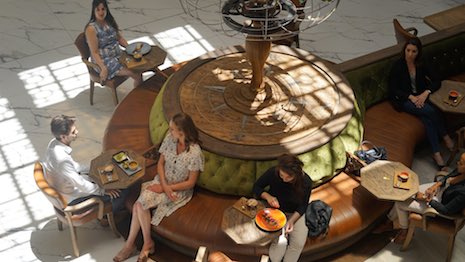
 The Coco Safar Cafe in Cape Town, South Africa. Image credit: Coco Safar
The Coco Safar Cafe in Cape Town, South Africa. Image credit: Coco Safar
 The chocolate is made by Coco Safar. Image credit: Coco Safar
The chocolate is made by Coco Safar. Image credit: Coco Safar Serving pastries at Coco Safar. Image credit: Coco Safar
Serving pastries at Coco Safar. Image credit: Coco Safar Bags of merchandise at Coco Safar. Image credit: Coco Safar
Bags of merchandise at Coco Safar. Image credit: Coco Safar Maryanne Maina
Maryanne Maina